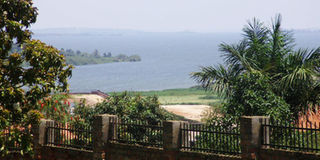Living in Muyenga, the rich man’s slum

What you need to know:
Even among foreigners, Muyenga is known as an upper class residential area. From the look of it, it is an ‘old money’ place. It is for people who arrived long ago.
I stand at an intersection of a close and drive and around me are fences enclosing houses that are mostly storied or elegantly gigantic. The sight of magnificent houses on a hill top lets me know it is not a residential area where just anyone resides.
The compounds are huge, the fences long, the streets, closes and drives are labelled and gates locked with entry only permitted after buzzing a door bell and for some, after scrutiny by a security guard.
Far off, I can hear dogs bark and see children riding bicycles on neatly kempt lawns. The cars that drive out of the gates are those that only say one thing – money and power. Muyenga, once was and still remains “the rich man’s slum’.
General perception
Muyenga is known as the upper class residential area as most confess. “From the look of it, it is an ‘old money’ place. It is for people that arrived long ago. I see signs of wealth when I am in a taxi passing by. The number of gated compounds and the styles and sizes of the houses say it all. If people had such houses long ago, then they were rich.
You mostly see the help cutting grass and watering the compound. The roads are very clear, you can almost stand in them,” comments Carol, a Kenyan residing in Uganda. “What I know about Muyenga is it’s very secure and the other thing is you may live there for so many years and never get to know your neighbors. There are people of all ages, not only the retired old as most people think,” says Sharon a resident. The area is also a favourite for Sudanese and Whites.
What makes it attractive?
Benjamin Sebusolo, LC1 chairman Muyenga B says, what used to and still makes the place attractive are attributes like it’s view of the lake, the quiet neighborhood and the fact that it was near the water reserves. “The place is generally secure because most of our roads do not directly lead to the main roads making the place locked in and secure,” he notes.
Kenneth Karugaba, a broker with Power Solutions and Brokers in Kisugu, a neighbouring area to Muyenga, adds, “It is still very marketable like before. This is mainly because it is secure, serene and hygienic.” When asked about whether they would like to live there, many people will quickly say, yes. Benjamin Tabaro, a young corporate says, “I would like to live in Muyenga. It is uptown, classy and everyone minds their business which is the kind of neighborhood I want”.
Affordability
Karugaba reveals that an average two bedroomed house can go for as high $1000 (Shs2.4m) a month. The place largely has rented houses and few own them. “This is because the cost of land and rent is too expensive. Those that mostly buy houses there are people working abroad who save money and come back and buy already finished houses,” he says.
Muyenga is bordered by Bukasa to the east, Kiwuliriza to the north, Kisugu and Kabalagala to the west, Kansanga to the southwest, Kiwafu to the south and Kyeyitabya to the southeast. Houses in these places are slightly cheaper and more affordable.
Business
One would not expect to find only tarmacked roads and for residents to have all they need in the confines of their fences but this is thrown out the window when you find small retail shops and shack restaurants in Muyenga.
All kinds of businesses have cropped up in the area including wooden stalls selling items like bananas, tomatoes, onions and avocados. Offices of major non-governmental organizations, fancy hotels and small retail shops selling general merchandise goods like bread, milk and sugar also exist but are not used by residents as main shopping centres.
“Many people have put up offices, schools, hotels, recreation centres, kiosks and market stalls which never used to be in Muyenga. There are no major markets so our nearest market is in Namuwongo,” Sebusolo notes. Located in the heart of Muyenga, is a small wooden restaurant –‘New Basis Restaurant, we serve breakfast, lunch and supper’.
Furnished with cushion less African craft chairs, wooden tables and two white and blue plastic chairs, its entrance is half covered by an old blue trampoline bag and the door held in place by a brown plastic tin that acts as a trash can. The cost of black tea is Shs500 while milk goes for Shs800. A plate of food costs Shs2,000 – Shs2,500.
The restaurant has been around for three years now and according to Faith, the cook, business is not really that good. Her clientele mainly consists builders on various sites around the village. “I sometimes get a few customers from the gates but these are mainly bachelors who can’t cook for themselves,” she says.
“There are small shops and restaurants but of course most people go to Kabalagala for shopping and around town. There are also bars and churches all over,” comments Paul, a resident.
Down side
Like any other area, Muyenga also has problems of load shedding and occasional water loss. Some roads are not tarmacked and it is also known for having problems with its drainage system. “We have a major problem of mosquitoes because we are near the Nakivubo valley water stream and another problem of land wrangles and conmen trying to sell people houses,” comments chairman Sebusolo.




